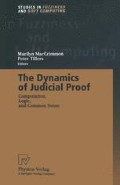Abstract
Following the positivistic philosophy of Karl Popper and Hans Reichenbach,1 many traditionalist thinkers on rational proof in law still assume a sharp distinction between “the context of discovery” and “the context of justification.” These traditionalists regard the context of justification as the proper province of legal reasoning. Justification deals with the analysis and appraisal of decisions, judgments, arguments, and verdicts once they are already “on the table.” Thus, questions about the rational adequacy of a judge’s verdict, or about a police decision to charge a suspect, or about the viability of a case that the District Attorney chooses to prosecute are all important to traditional theories. However, questions about discovery2 play little or no role in many accounts of evidential reasoning in law. The traditionalist does not claim that discovery and imagination are unimportant. Rather, her claim is that a theory of legal reasoning should concern itself only with the logic of rational arguments. Imagination and discovery should be left to the psychologist. The legal theorist Neil MacCormick states this traditional stance very succinctly: “[I]n relation to legal reasoning, the process which is worth studying is the process of argumentation as a process of justification.”3
Access this chapter
Tax calculation will be finalised at checkout
Purchases are for personal use only
Preview
Unable to display preview. Download preview PDF.
References
See, e.g, SIR KARL POPPER, THE LOGIC OF SCIENTIFIC DISCOVERY ( 1968 ); HANS REICHENBACH, THE RISE OF SCIENTIFIC PHILOSOPHY (1951).
That is, the imaginative process by which facts, evidence, arguments, or judgments are generated to start with.
NEIL MACCORMICK, LEGAL REASONING AND LEGAL THEORY 19 (1978) (citations omitted).
David A. Schum, Species of Abductive Reasoning in Fact Investigation in Law, in THE DYNAMICS OF JUDICIAL PROOF: COMPUTATION, LOGIC AND COMMON SENSE (Marilyn MacCrimmon und Peter Tillers eds., Springer-Verlag 2002) 307 [hereinafter Schum, Species]; see also DAVID A. SCHUM, THE EVIDENTIAL FOUNDATIONS OF PROBABILISTIC REASONING (1994) [hereinafter SCHUM, EVIDENTIAL FOUNDATIONS]; David A. Schum, Probability and the Processes of Discovery, Proof and Choice,66 B.U. L. REV. 825 (1986) [hereinafter Schum, Probability and Discovery]. 338 Kola Abimbola
Schum, Species, supra note 4, at 307.
Id. at 309.
Id. at 314–5 (citations omitted).
See, e.g., UMBERTO Eco, A THEORY OF SEMIOTICS ( 1976 ); UMBERTO Eco, SEMIOTICS AND THE PHILOSOPHY OF LANGUAGE (1984).
See generallyPAUL THAGARD, COMPUTATIONAL PHILOSOPHY OF SCIENCE (1988).
See generallySchum, Species, supra note 4. This author agrees with Schum’s characterization of the variety of abductions.
See generally id.
See generally id.
Schum, Species, supra note 4, at 318.
See SCHUM, EVIDENTIAL FOUNDATIONS, supra note 4, at 71–75, 139–40; see also TERENCE ANDERSON und WILLIAM TWINING, ANALYSIS OF EVIDENCE: How TO Do THINGS WITH FACTS (1991) (explaining the overall importance of standpoints to legal analysis).
R.G. COLLINGWOOD, THE IDEA OF HISTORY 41–42 (1993) (providing this hypothetical).
Schum, Species, supra note 4, at 318.
At least the police ought not to infer that X is a criminal simply because it provides one possible explanation. However, in some gross miscarriages of justice it often appears as if this is precisely what the police have done!
Schum, Species, supra note 4, at 330.
Editor information
Editors and Affiliations
Rights and permissions
Copyright information
© 2002 Physica-Verlag Heidelberg
About this chapter
Cite this chapter
Abimbola, K. (2002). Abductive Reasoning in Law: Taxonomy and Inference to the Best Explanation. In: MacCrimmon, M., Tillers, P. (eds) The Dynamics of Judicial Proof. Studies in Fuzziness and Soft Computing, vol 94. Physica, Heidelberg. https://doi.org/10.1007/978-3-7908-1792-8_17
Download citation
DOI: https://doi.org/10.1007/978-3-7908-1792-8_17
Publisher Name: Physica, Heidelberg
Print ISBN: 978-3-662-00323-7
Online ISBN: 978-3-7908-1792-8
eBook Packages: Springer Book Archive

